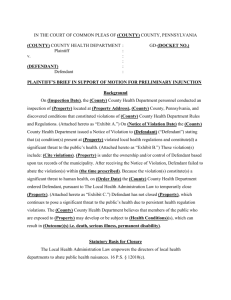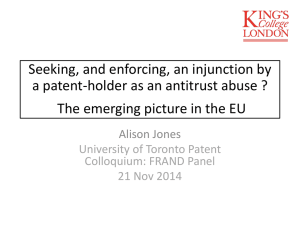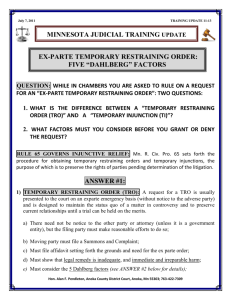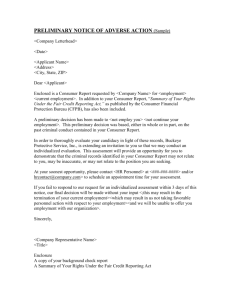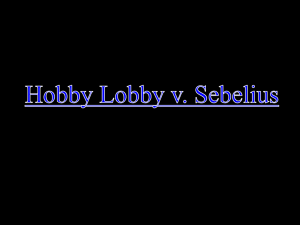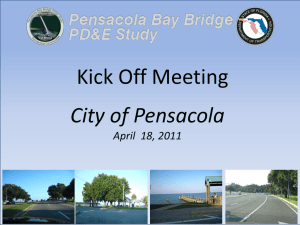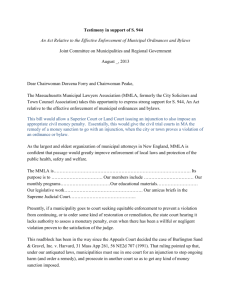Roxana v. WRB - Donald M. Craven, PC
advertisement
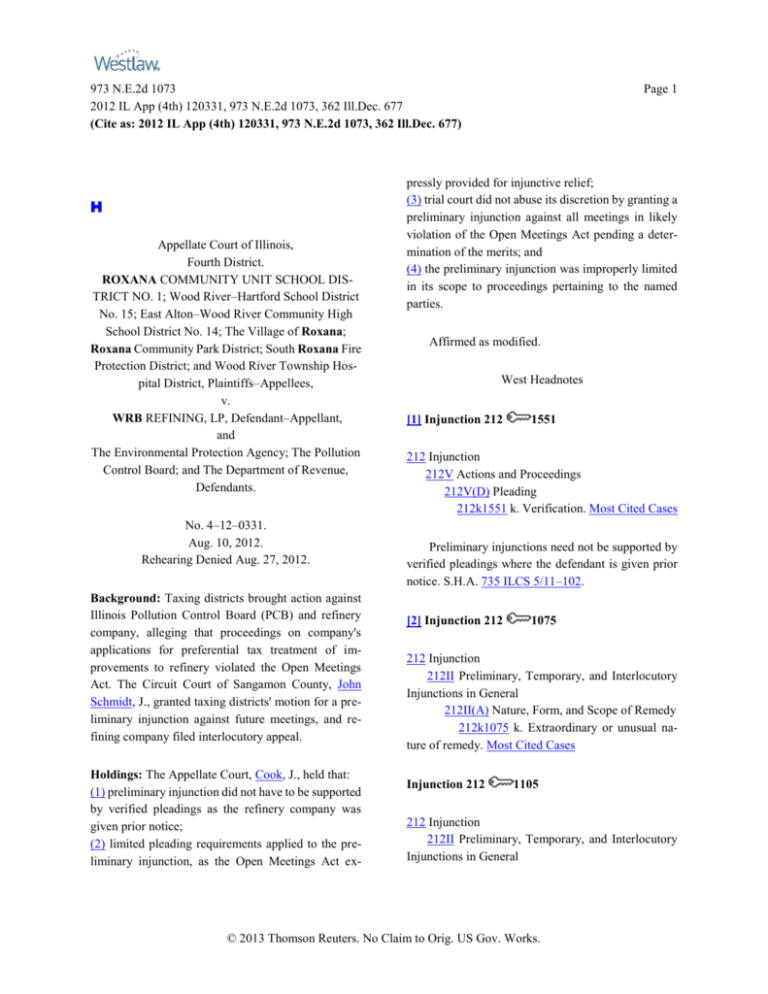
973 N.E.2d 1073 2012 IL App (4th) 120331, 973 N.E.2d 1073, 362 Ill.Dec. 677 (Cite as: 2012 IL App (4th) 120331, 973 N.E.2d 1073, 362 Ill.Dec. 677) Appellate Court of Illinois, Fourth District. ROXANA COMMUNITY UNIT SCHOOL DISTRICT NO. 1; Wood River–Hartford School District No. 15; East Alton–Wood River Community High School District No. 14; The Village of Roxana; Roxana Community Park District; South Roxana Fire Protection District; and Wood River Township Hospital District, Plaintiffs–Appellees, v. WRB REFINING, LP, Defendant–Appellant, and The Environmental Protection Agency; The Pollution Control Board; and The Department of Revenue, Defendants. No. 4–12–0331. Aug. 10, 2012. Rehearing Denied Aug. 27, 2012. Background: Taxing districts brought action against Illinois Pollution Control Board (PCB) and refinery company, alleging that proceedings on company's applications for preferential tax treatment of improvements to refinery violated the Open Meetings Act. The Circuit Court of Sangamon County, John Schmidt, J., granted taxing districts' motion for a preliminary injunction against future meetings, and refining company filed interlocutory appeal. Holdings: The Appellate Court, Cook, J., held that: (1) preliminary injunction did not have to be supported by verified pleadings as the refinery company was given prior notice; (2) limited pleading requirements applied to the preliminary injunction, as the Open Meetings Act ex- Page 1 pressly provided for injunctive relief; (3) trial court did not abuse its discretion by granting a preliminary injunction against all meetings in likely violation of the Open Meetings Act pending a determination of the merits; and (4) the preliminary injunction was improperly limited in its scope to proceedings pertaining to the named parties. Affirmed as modified. West Headnotes [1] Injunction 212 1551 212 Injunction 212V Actions and Proceedings 212V(D) Pleading 212k1551 k. Verification. Most Cited Cases Preliminary injunctions need not be supported by verified pleadings where the defendant is given prior notice. S.H.A. 735 ILCS 5/11–102. [2] Injunction 212 1075 212 Injunction 212II Preliminary, Temporary, and Interlocutory Injunctions in General 212II(A) Nature, Form, and Scope of Remedy 212k1075 k. Extraordinary or unusual nature of remedy. Most Cited Cases Injunction 212 1105 212 Injunction 212II Preliminary, Temporary, and Interlocutory Injunctions in General © 2013 Thomson Reuters. No Claim to Orig. US Gov. Works. 973 N.E.2d 1073 2012 IL App (4th) 120331, 973 N.E.2d 1073, 362 Ill.Dec. 677 (Cite as: 2012 IL App (4th) 120331, 973 N.E.2d 1073, 362 Ill.Dec. 677) 212II(B) Factors Considered in General 212k1101 Injury, Hardship, Harm, or Effect 212k1105 k. Substantial nature of injury. Most Cited Cases A preliminary injunction is an extraordinary remedy that should be granted only in situations of extreme emergency or where serious harm would result if the preliminary injunction was not issued. [3] Injunction 212 1092 212 Injunction 212II Preliminary, Temporary, and Interlocutory Injunctions in General 212II(B) Factors Considered in General 212k1092 k. Grounds in general; multiple factors. Most Cited Cases Ordinarily, a preliminary injunction is warranted if the movant raises a fair question the following elements are satisfied: (1) a clearly ascertainable right requires protection; (2) irreparable injury will result in the absence of an injunction; (3) no adequate remedy at law is available; and (4) the moving party is likely to succeed on the merits of the case. [4] Injunction 212 1109 212 Injunction 212II Preliminary, Temporary, and Interlocutory Injunctions in General 212II(B) Factors Considered in General 212k1101 Injury, Hardship, Harm, or Effect 212k1109 k. Balancing or weighing hardship or injury. Most Cited Cases A preliminary injunction should be issued only if the harm to the plaintiff in the absence of such relief is likely to outweigh the harm to the defendant if the relief is granted. [5] Injunction 212 Page 2 1092 212 Injunction 212II Preliminary, Temporary, and Interlocutory Injunctions in General 212II(B) Factors Considered in General 212k1092 k. Grounds in general; multiple factors. Most Cited Cases An exception to the burden on a preliminary injunction movant, to raise a fair question that each of the elements required for a preliminary injunction are satisfied, exists where injunctive relief is expressly authorized by statute. [6] Injunction 212 1100 212 Injunction 212II Preliminary, Temporary, and Interlocutory Injunctions in General 212II(B) Factors Considered in General 212k1100 k. Public interest considerations. Most Cited Cases Injunction 212 1247 212 Injunction 212IV Particular Subjects of Relief 212IV(E) Governments, Laws, and Regulations in General 212k1247 k. Injunctions against government officials in general. Most Cited Cases Injunction 212 1250 212 Injunction 212IV Particular Subjects of Relief 212IV(E) Governments, Laws, and Regulations in General 212k1250 k. Injunctions to enforce laws and regulations in general. Most Cited Cases © 2013 Thomson Reuters. No Claim to Orig. US Gov. Works. 973 N.E.2d 1073 2012 IL App (4th) 120331, 973 N.E.2d 1073, 362 Ill.Dec. 677 (Cite as: 2012 IL App (4th) 120331, 973 N.E.2d 1073, 362 Ill.Dec. 677) The exception to the burden on preliminary injunction movants, who are ordinarily are required to raise a fair question that each of the elements required for a preliminary injunction are satisfied, when injunction relief is expressly authorized by statute applies only where either: (1) injunctive relief is provided for public officials to use in enforcing the statute or to afford citizens a private right of action to restrain public officials from violating a statute defining official duties or powers, or (2) even an isolated violation of the statute is presumed to cause irreparable harm to the public. [7] Injunction 212 1250 212 Injunction 212IV Particular Subjects of Relief 212IV(E) Governments, Laws, and Regulations in General 212k1250 k. Injunctions to enforce laws and regulations in general. Most Cited Cases Injunction 212 1505 212 Injunction 212V Actions and Proceedings 212V(A) In General 212k1505 k. Persons entitled to apply; standing. Most Cited Cases 149E Environmental Law 149EXIII Judicial Review or Intervention 149Ek673 k. Pleading, petition, or application. Most Cited Cases Limited pleading requirements for injunctions expressly authorized by statute applied, when taxing districts sought a preliminary injunction in their action alleging that the Illinois Pollution Control Board (PCB) violated the Open Meetings Act during proceedings on applications by refinery company for preferential tax treatment of improvements to refinery, as the Act's purpose was to ensure that meetings of public bodies were accessible to the public, the Act expressly provided for injunctive relief where justified, and the provision allowing injunctions gave rise to a presumption that a violation of the Act caused a distinctly public harm. S.H.A. 5 ILCS 120/1, 120/3(c). [9] Appeal and Error 30 [8] Environmental Law 149E 673 954(1) 30 Appeal and Error 30XVI Review 30XVI(H) Discretion of Lower Court 30k950 Provisional Remedies 30k954 Injunction 30k954(1) k. In general. Most Cited Cases Appeal and Error 30 In order for a preliminary injunction movant, when injunctive relief is expressly authorized by statute, to be relieved of the burden to raise a fair question that each of the elements required for a preliminary injunction are satisfied, the movant must allege and show only that: (1) the defendant has violated the statute, and (2) the plaintiff has standing; there is no necessity to prove irreparable damage or the absence of an adequate remedy at law. Page 3 954(2) 30 Appeal and Error 30XVI Review 30XVI(H) Discretion of Lower Court 30k950 Provisional Remedies 30k954 Injunction 30k954(2) k. Refusing injunction. Most Cited Cases A trial court's decision granting or denying a preliminary injunction is reviewed for an abuse of © 2013 Thomson Reuters. No Claim to Orig. US Gov. Works. 973 N.E.2d 1073 2012 IL App (4th) 120331, 973 N.E.2d 1073, 362 Ill.Dec. 677 (Cite as: 2012 IL App (4th) 120331, 973 N.E.2d 1073, 362 Ill.Dec. 677) discretion, which occurs only when its ruling is arbitrary, fanciful, or unreasonable, or when no reasonable person would adopt the court's view. [10] Appeal and Error 30 954(1) 30 Appeal and Error 30XVI Review 30XVI(H) Discretion of Lower Court 30k950 Provisional Remedies 30k954 Injunction 30k954(1) k. In general. Most Cited Cases Appeal and Error 30 Meetings Act pending a determination of the merits, in taxing districts' action against Illinois Pollution Control Board (PCB) and refinery company alleging that the PCB violated the Act during proceedings on applications by refinery company for preferential tax treatment of improvements to refinery; taxing districts made out a case that PCB routinely violated the Act, taxing districts likely had standing as the refinery was the single largest property taxpayer for most of the taxing districts, and at least two allegedly improper upcoming meetings concerning the refinery company's applications were anticipated. S.H.A. 5 ILCS 120/2(a), 120/2.02, 120/2.06(g). [12] Environmental Law 149E 954(2) 30 Appeal and Error 30XVI Review 30XVI(H) Discretion of Lower Court 30k950 Provisional Remedies 30k954 Injunction 30k954(2) k. Refusing injunction. Most Cited Cases When a trial court decision granting or denying a preliminary injunction is reviewed, each substantive issue should be considered only insofar as necessary to determine whether there has been an abuse of discretion. [11] Environmental Law 149E Page 4 701 149E Environmental Law 149EXIII Judicial Review or Intervention 149Ek699 Injunction 149Ek701 k. Preliminary injunction. Most Cited Cases Trial court did not abuse its discretion by granting taxing districts' motion for a preliminary injunction against all meetings in likely violation of the Open 701 149E Environmental Law 149EXIII Judicial Review or Intervention 149Ek699 Injunction 149Ek701 k. Preliminary injunction. Most Cited Cases Preliminary injunction issued by trial court, in action by taxing districts alleging that the Illinois Pollution Control Board (PCB) violated the Open Meetings Act in regards to proceedings on applications by refinery company for preferential tax treatment of improvements to refinery, was improperly limited in its scope to meetings pertaining to the named parties; taxing districts made out a case that PCB routinely violated the Open Meetings Act, the broad language of the Act suggested that any violation of the Act harmed members of the public regardless of whether the violation affected some more particularly than others, and the trial court was authorized to enjoin all meetings of the PCB that it found would likely violate the Act. S.H.A. 5 ILCS 120/2(a), 120/2.02, 120/3(a, c), 120/2.06(g). [13] Injunction 212 1248 212 Injunction © 2013 Thomson Reuters. No Claim to Orig. US Gov. Works. 973 N.E.2d 1073 2012 IL App (4th) 120331, 973 N.E.2d 1073, 362 Ill.Dec. 677 (Cite as: 2012 IL App (4th) 120331, 973 N.E.2d 1073, 362 Ill.Dec. 677) 212IV Particular Subjects of Relief 212IV(E) Governments, Laws, and Regulations in General 212k1248 k. Meetings and proceedings in general. Most Cited Cases When a public body is called into court to defend claims that it violated the Open Meetings Act, the trial court has jurisdiction to enjoin any future meetings of that public body that are likely to violate the statute, regardless of whether the matters discussed at those meetings affect the plaintiffs or any other named party. S.H.A. 5 ILCS 120/3(a). *1075 Larry E. Hepler, Beth A. Bauer, Thomas H. Wilson (argued), Michael P. Murphy, HeplerBroom, LLC, Springfield, for appellant. Stuart L. Whitt, Joshua S. Whitt, Brittany Flaherty Theis, Whitt Law LLC, Aurora, Donald M. Craven (argued), Esther J. Seitz, Donald M. Craven, P.C., Springfield, for appellee Roxana Community School District No. 1. *1076 OPINION Justice COOK delivered the judgment of the court, with opinion. **680 ¶ 1 In March 2012, plaintiffs, several Madison County taxing districts, filed a complaint for injunctive and declaratory relief against defendants, the Illinois Environmental Protection Agency (EPA), the Illinois Pollution Control Board (PCB), the Illinois Department of Revenue (DOR), and WRB Refining, LP. In relevant part, plaintiffs alleged the PCB's proceedings regarding the certification of pollution control facilities (see 35 ILCS 200/ 11–5 to 11–30 (West 2010)) violated the notice and openness requirements of the Open Meetings Act (5 ILCS 120/1 to 7.5 (West 2010)) and the PCB's enabling statute and sought an injunction prohibiting the PCB from conducting further meetings in violation of those statutes. Later that month, plaintiffs filed a motion for preliminary in- Page 5 junction. In April 2012, citing section 3(c) of the Open Meetings Act (5 ILCS 120/3(c) (West 2010)), the trial court granted a preliminary injunction against any future meetings of the PCB insofar as they pertained to plaintiffs' appearances before the PCB and WRB Refining's applications for the treatment of several improvements to its real property as pollution control facilities. ¶ 2 WRB Refining appeals, arguing, in relevant part, that the trial court erred because its injunction was not warranted. WRB Refining asserts the injunction is deficient in two related respects: (1) it uniquely affects the PCB's meetings concerning WRB Refining's petitions while allowing the PCB to continue allegedly violating the Open Meetings Act in other proceedings and (2) it prohibits all such meetings regardless of whether they comply with the Open Meetings Act. For these reasons, WRB Refining argues the preliminary injunction unfairly prejudices WRB Refining and does not advance the Open Meetings Act's goal of ensuring that all meetings of public bodies are open to the public. ¶ 3 We agree in part with WRB Refining that the scope of the preliminary injunction should be altered. Accordingly, we modify the injunction entered by the trial court so it more closely comports with equity and the intent of the Open Meetings Act by removing its restriction that it applies only to these parties' business before the PCB. ¶ 4 I. BACKGROUND ¶ 5 Plaintiffs are local taxing districts in Madison County that derive revenue from property taxes collected within their boundaries—namely, Roxana Community Unit School District No. 1; Wood River–Hartford School District No. 15; East Alton–Wood River Community High School District No. 14; Village of Roxana; Roxana Community Park District; South Roxana Fire Protection District; and Wood River Township Hospital District. © 2013 Thomson Reuters. No Claim to Orig. US Gov. Works. 973 N.E.2d 1073 2012 IL App (4th) 120331, 973 N.E.2d 1073, 362 Ill.Dec. 677 (Cite as: 2012 IL App (4th) 120331, 973 N.E.2d 1073, 362 Ill.Dec. 677) ¶ 6 Defendant WRB Refining operates the Wood River Refinery in Madison County. The refinery is among the largest in the United States and is a significant source of property taxes for plaintiffs. For most of them, WRB Refining represents plaintiffs' single largest property taxpayer. In 2006, WRB Refining announced plans to renovate its refinery. According to plaintiffs, approximately $3.6 billion in improvements were made during the renovations, which were completed in 2011. ¶ 7 Beginning in 2010, WRB Refining sought the preferential tax treatment of about $3 billion in improvements as pollution control facilities under section 11–5 of the Property Tax Code (35 ILCS 200/11–5 (West 2010)). Pollution control facilities are assessed by the DOR, not the county **681 *1077 taxing authorities. 35 ILCS 200/11–20 (West 2010). Their valuation is based on the fair cash value of their economic productivity to their owners rather than the fair cash value of the facilities themselves. Compare 35 ILCS 200/11–5 (West 2010) (pertaining to valuation of pollution control facilities), with 35 ILCS 200/9–145 (West 2010) (pertaining to general valuation procedures). To obtain the certifications, WRB Refining submitted about 60 applications to the EPA, covering each improvement that it believed qualified as a pollution control facility. See 35 Ill. Adm.Code 125.202 (2012). WRB Refining's applications asserted that the economic productivity of these improvements was of little or no value to WRB Refining. The EPA was responsible for making a recommendation to the PCB whether to grant each certification. 35 Ill. Adm.Code 125.204 (2012). It made favorable recommendations on several of WRB Refining's applications. ¶ 8 Upon the EPA's action, the PCB was responsible for ultimately deciding whether to certify WRB Refining's improvements as pollution control facilities. 35 ILCS 200/11–20 (West 2010). Plaintiffs discovered that WRB Refining's applications were in- Page 6 cluded on the agendas of some “closed deliberative meetings” of the PCB through the PCB's Web site. Plaintiffs feared that the favorable property-tax treatment of WRB Refining's improvements, were they certified as pollution control facilities and assessed based on the values indicated in WRB Refining's applications, would deprive plaintiffs of significant revenues. They petitioned to intervene in 28 specific PCB proceedings involving WRB Refining's applications. The PCB denied plaintiffs' petitions, as well as their motions to reconsider. (Plaintiffs' consolidated petitions for administrative review in these 28 proceedings are pending before this court in case Nos. 4–12–0174 through 4–12–0201.) The PCB granted several of WRB Refining's applications that the EPA recommended for certification. ¶ 9 In March 2012, plaintiffs filed their unverified complaint in the instant case. In relevant part, they alleged the PCB's proceedings violated the Open Meetings Act and the PCB's enabling statute, the Environmental Protection Act (415 ILCS 5/1 to 7.5 (West 2010)). Specifically, plaintiffs alleged the PCB conducted unauthorized closed meetings to deliberate plaintiffs' intervention motions and the merits of WRB Refining's applications, scheduled closed meetings more than three months in advance, adopted invalid rules, allowed only PCB members or staff to speak at public meetings, and occasionally carried over agenda items from one meeting to the next. Plaintiffs sought a declaratory judgment stating the PCB's proceedings violated the Open Meetings Act and the Environmental Protection Act and an injunction barring future meetings of the PCB in violation of those statutes. (Other counts pertaining to a Freedom of Information Act (5 ILCS 140/1 to 11.5 (West 2010)) request that plaintiffs submitted to the EPA and various constitutional challenges are not at issue on appeal.) Later that month, plaintiffs moved for a preliminary injunction. The assertions in their motion pertaining to the alleged Open Meetings Act violations were unverified—that is, they were not supported by an accompanying affidavit. © 2013 Thomson Reuters. No Claim to Orig. US Gov. Works. 973 N.E.2d 1073 2012 IL App (4th) 120331, 973 N.E.2d 1073, 362 Ill.Dec. 677 (Cite as: 2012 IL App (4th) 120331, 973 N.E.2d 1073, 362 Ill.Dec. 677) ¶ 10 On March 30, 2012, the trial court held a hearing on plaintiffs' motion for preliminary injunction. The hearing was transcribed by a private court reporter hired by the parties. In its oral pronouncement following arguments, the court granted a preliminary injunction enjoining the PCB from holding any further meetings concerning “these plaintiffs and these defendants until we can get a resolution**682 *1078 after a full hearing on the merits of this case in the very near future.” The court stated, “[T]he only way to [address the court's concerns regarding future harm] is to put a freeze on this, to stop this process from moving forward.” The written order in the corresponding docket entry states that the court granted plaintiffs' motion for preliminary injunction pursuant to section 3(c) of the Open Meetings Act (5 ILCS 120/3(c) (West 2010)), barring future violations of that Act. The court specified in its docket entry that its ruling applied only to the PCB's activities concerning the named plaintiffs and the named defendants. That is, the injunction prohibited the PCB from considering either plaintiffs' motions to intervene in its proceedings or WRB Refining's applications for pollution control facility certifications at any future meeting until the court ruled on the merits of plaintiffs' case. ¶ 11 This interlocutory appeal by WRB Refining followed. The governmental defendants did not participate in this appeal. ¶ 12 II. ANALYSIS ¶ 13 On appeal, WRB Refining argues the trial court's order enjoining future meetings of the PCB related to “these plaintiffs and these defendants” does not comport with the Open Meetings Act. We conclude that the preliminary injunction should be modified to enjoin all interim meetings of the PCB regardless of whether they specifically concern these plaintiffs or WRB Refining. ¶ 14 A. Arguments Concerning Procedure and the Page 7 Issuance of the Preliminary Injunction ¶ 15 Initially, WRB Refining argues that plaintiffs' pleadings were insufficient to entitle them to a preliminary injunction. Specifically, it contends that (1) plaintiffs' pleadings were deficient in that they were unverified and (2) plaintiffs failed to allege facts satisfying each of the elements comprising a claim for a preliminary injunction. We disagree. ¶ 16 1. Verification of Pleadings ¶ 17 We first note WRB Refining's assertion that the trial court erred by relying on unverified pleadings in granting the preliminary injunction. This assertion is contrary to authority, which we discuss to emphasize the propriety of the court's ruling that plaintiffs' pleadings were adequate. [1] ¶ 18 Section 11–102 of the Code of Civil Procedure (735 ILCS 5/11–102 (West 2010)) governs preliminary injunctions. That statute provides, in toto, “No court or judge shall grant a preliminary injunction without previous notice of the time and place of the application having been given the adverse party.” 735 ILCS 5/11–102 (West 2010). It contains no requirement that the pleadings on which the preliminary injunction is granted be verified. ¶ 19 A few decades-old cases discuss the question of a verification requirement. In Hoover v. Crippen, 151 Ill.App.3d 864, 868, 105 Ill.Dec. 8, 503 N.E.2d 848, 852 (1987), the Third District Appellate Court identified a dispute among courts concerning whether a movant for preliminary injunction was required to verify its pleadings. At the time of this split in authority, preliminary injunctions issued without notice to the defendant were expressly required to be supported by verified pleadings. See Ill.Rev.Stat.1985, ch. 110, ¶ 11–102 (the most recent version of the statute containing such language); cf. 735 ILCS 5/11–102 (West 2010) (omitting any reference to verification). As recently as the 1970s, some courts held or stated that verification was required even when the defendant received notice. See, e.g., Hall v. Or- © 2013 Thomson Reuters. No Claim to Orig. US Gov. Works. 973 N.E.2d 1073 2012 IL App (4th) 120331, 973 N.E.2d 1073, 362 Ill.Dec. 677 (Cite as: 2012 IL App (4th) 120331, 973 N.E.2d 1073, 362 Ill.Dec. 677) likowski Construction Co., 24 Ill.App.3d 60, 63, 321 N.E.2d 23, 26 (1974) **683 *1079 (Second District: “It is * * * an abuse of discretion to issue a preliminary injunction on an unverified complaint which is not supported by a verified petition or affidavit.”); Phelan v. Wright, 54 Ill.App.2d 178, 181, 203 N.E.2d 587, 589 (1964) (First District: “ It is indispensable to the right to temporary injunction that all material facts alleged be properly verified by affidavit.” (Internal quotation marks omitted.)). Some contemporary courts reached the opposite conclusion. See, e.g., County of Lake v. X–Po Security Police Service, Inc., 27 Ill.App.3d 750, 756, 327 N.E.2d 96, 100 (1975) (Second District: “Since verified pleadings are not required where a preliminary injunction is sought upon notice, it therefore follows that verification or affidavit is not required where an application for an injunction is made upon notice and where the defendants appear * * *.”). The thrust of post–1980 opinions supports the latter view: that preliminary injunctions need not be supported by verified pleadings where, as in this case, the defendant is given prior notice. See, e.g., Hough v. Weber, 202 Ill.App.3d 674, 688, 147 Ill.Dec. 857, 560 N.E.2d 5, 16 (1990) (Second District); Barrett v. Lawrence, 110 Ill.App.3d 587, 592, 66 Ill.Dec. 173, 442 N.E.2d 599, 602–03 (1982) (First District); Regional Transportation Authority v. Burlington Northern Inc., 100 Ill.App.3d 779, 785, 55 Ill.Dec. 818, 426 N.E.2d 1143, 1148 (1981) (First District). Our research has uncovered no more recent opinion applying the current version of the statute, which no longer allows preliminary injunctions to issue without prior notice to the defendant under any circumstances. (Rather, temporary injunctive relief without notice to the defendant may, in some circumstances, be provided in the form of a temporary restraining order. See 735 ILCS 5/11–101 (West 2010).) However, it has been settled since before the revision that verification is not required if the defendant receives notice as mandated by the current version of the preliminary-injunction statute. ¶ 20 In this case, defendants, including WRB Page 8 Refining, were notified that plaintiffs sought a preliminary injunction. They entered their appearances and participated at the hearing on plaintiffs' motion. Accordingly, it is irrelevant that plaintiffs' complaint and motion were unverified. The trial court did not err by relying on the allegations of plaintiffs' unverified pleadings in granting the preliminary injunction. ¶ 21 2. Sufficiency of Plaintiffs' Allegations ¶ 22 Next, we consider WRB Refining's argument that plaintiffs failed to meet the requirements of a preliminary injunction. We conclude the trial court did not err in finding a preliminary injunction was justified by plaintiffs' allegations. [2][3][4] ¶ 23 A preliminary injunction is an “extraordinary” remedy that “should be granted only in situations of extreme emergency or where serious harm would result if the preliminary injunction was not issued.” Clinton Landfill, Inc. v. Mahomet Valley Water Authority, 406 Ill.App.3d 374, 378, 348 Ill.Dec. 117, 943 N.E.2d 725, 729 (2010). Ordinarily, a preliminary injunction is warranted if (1) a clearly ascertainable right requires protection, (2) irreparable injury will result in the absence of an injunction, (3) no adequate remedy at law is available, and (4) the moving party is likely to succeed on the merits of the case. Id. In addition, a preliminary injunction should be issued only if the harm to the plaintiff in the absence of such relief is likely to outweigh the harm to the defendant if the relief is granted. Id. To obtain a preliminary injunction, the movant must raise a “fair **684 *1080 question” that each of these elements is satisfied. Id. [5][6][7] ¶ 24 However, an exception to this burden exists where injunctive relief is expressly authorized by statute. Postma v. Jack Brown Buick, Inc., 157 Ill.2d 391, 400, 193 Ill.Dec. 166, 626 N.E.2d 199, 204 (1993). This exception is limited—it applies only where either (1) injunctive relief is provided “for public officials to use in enforcing” the statute or “to afford citizens a private right of action to restrain © 2013 Thomson Reuters. No Claim to Orig. US Gov. Works. 973 N.E.2d 1073 2012 IL App (4th) 120331, 973 N.E.2d 1073, 362 Ill.Dec. 677 (Cite as: 2012 IL App (4th) 120331, 973 N.E.2d 1073, 362 Ill.Dec. 677) public officials from” violating a statute defining official duties or powers; or (2) “even an isolated violation” of the statute is presumed to cause irreparable harm to the public. Id. In such cases, the plaintiff must allege and show only that (1) the defendant has violated the statute and (2) the plaintiff has standing—“there is no necessity to prove irreparable damage or the absence of an adequate remedy at law.” People v. Keeven, 68 Ill.App.3d 91, 97, 24 Ill.Dec. 663, 385 N.E.2d 804, 808 (1979). But cf. Oscar George Electric Co. v. Metropolitan Fair & Exposition Authority, 104 Ill.App.3d 957, 966, 60 Ill.Dec. 720, 433 N.E.2d 958, 964 (1982) (requiring the party seeking a preliminary injunction in such a case to show (1) “that the threatened injury to it will be immediate, certain and great if the injunction is denied while loss or inconvenience to the opposing party will be comparatively small and insignificant if it is granted,” (2) “that the requesting party has a reasonable likelihood of prevailing on the merits of the case,” and (3) “that granting the preliminary injunction will not have an injurious effect upon the general public”). ¶ 25 The parties dispute whether the general rule or the exception applies in this case. The trial court made no explicit ruling on this issue. At any rate, our review of this purely legal question is de novo. See World Painting Co. v. Costigan, 2012 IL App (4th) 110869, ¶ 12, 359 Ill.Dec. 755, 967 N.E.2d 485. We agree with plaintiffs that the exception applies. [8] ¶ 26 The Open Meetings Act was intended “to ensure that the actions of public bodies be taken openly and that their deliberations be conducted openly.” 5 ILCS 120/1 (West 2010). Section 3(c) of the Open Meetings Act concerns the relief available to parties aggrieved by violations of the statute's notice and openness requirements. In relevant part, it provides, “The court, having due regard for orderly administration and the public interest, as well as for the interests of the parties, may grant such relief as it deems appropriate, including * * * granting an in- Page 9 junction against future violations of this Act * * *.” 5 ILCS 120/3(c) (West 2010). As with the statutes in cases applying the exception to the traditional pleading requirements, such as Postma and Keeven, the Open Meetings Act expressly provides for injunctive relief where justified. Considering the Open Meetings Act's purpose of ensuring that meetings of public bodies are accessible to the public, we find the provision allowing injunctions gives rise to a presumption that the violation of this statute causes a distinctly public harm. Moreover, an injunction against violations of the Open Meetings Act restrains officials from breaching their statutory duty to conduct their public business openly. For these reasons, the limited pleading requirements for injunctions expressly authorized by statute applies in this case. See Postma, 157 Ill.2d at 400, 193 Ill.Dec. 166, 626 N.E.2d at 204. The cases cited by WRB Refining that apply the general preliminary-injunction requirements to requests for injunctions under the Open Meetings Act are not persuasive as, apparently, the parties there did not assert that any alternative burden applied and the court in each case made no explicit ruling on this **685 *1081 issue. See Hopf v. Topcorp, Inc., 170 Ill.App.3d 85, 90, 122 Ill.Dec. 629, 527 N.E.2d 1, 4 (1988); Lindsey v. Board of Education of the City of Chicago, 127 Ill.App.3d 413, 418–19, 82 Ill.Dec. 365, 468 N.E.2d 1019, 1024 (1984). [9][10] ¶ 27 Next, we must determine whether the trial court erred in finding plaintiffs satisfied their burden. We review a trial court's decision granting or denying a preliminary injunction for an abuse of discretion, which occurs “only when its ruling is arbitrary, fanciful, or unreasonable, or when no reasonable person would adopt the court's view.” (Internal quotation marks omitted.) Clinton Landfill, 406 Ill.App.3d at 378, 348 Ill.Dec. 117, 943 N.E.2d at 729. In doing so, “each substantive issue should be considered only insofar as necessary to determine whether there has been an abuse of discretion.” Oscar George, 104 Ill.App.3d at 966, 60 Ill.Dec. 720, 433 N.E.2d at 965. Plaintiffs accurately quote the principle that “[n]o © 2013 Thomson Reuters. No Claim to Orig. US Gov. Works. 973 N.E.2d 1073 2012 IL App (4th) 120331, 973 N.E.2d 1073, 362 Ill.Dec. 677 (Cite as: 2012 IL App (4th) 120331, 973 N.E.2d 1073, 362 Ill.Dec. 677) Page 10 discretion is vested in the court to refuse to issue an injunction to enforce the terms of” a statute expressly providing for injunctive relief from violations thereof. Keeven, 68 Ill.App.3d at 97, 24 Ill.Dec. 663, 385 N.E.2d at 808. However, this should not be understood to preclude appellate review of the trial court's judgment in such a case, or to affect the standard we apply in reviewing the grant of a preliminary injunction. See Oscar George, 104 Ill.App.3d at 966, 60 Ill.Dec. 720, 433 N.E.2d at 965 (reviewing the issuance of a preliminary injunction in such a case for an abuse of the trial court's “broad discretionary powers”). affected only WRB Refining's applications before the PCB and unnecessarily barred any PCB meetings regardless of whether they complied with the Open Meetings Act. We agree that it is unfair for the injunction to apply only to those meetings pertaining to the named parties and that this limitation on the injunction's scope was unnecessary. However, we disagree that the injunction is overly broad in barring all meetings of the PCB pending the resolution of this lawsuit. Therefore, we modify the preliminary injunction to preclude all PCB meetings until**686 *1082 the court reaches a determination on the merits of plaintiffs' case. [11] ¶ 28 In this case, plaintiffs alleged that the PCB routinely violated the Open Meetings Act and the Environmental Protection Act—specifically, their requirements that (1) a public body's meetings must be open to the public (5 ILCS 120/2(a) (West 2010)), (2) notice of meetings and agendas must be given (5 ILCS 120/2.02 (West 2010)), (3) any person attending a public meeting must be allowed to address the public body (5 ILCS 120/2.06(g) (West 2010)), and (4) all meetings of the PCB “shall be open to the public” (415 ILCS 5/5(a) (West 2010)). Defendants claimed they were unprepared to dispute the substance of plaintiffs' allegations. The trial court did not abuse its discretion by finding plaintiffs had raised a fair question of whether they had standing and the PCB's proceedings violated the Open Meetings Act. Further, it was not an abuse of discretion to conclude that a preliminary injunction was necessary to prevent future violations that would have harmed plaintiffs as at least two allegedly improper upcoming meetings concerning WRB Refining's petitions were anticipated and as, according to plaintiffs' undisputed allegations, the procedures currently employed by the PCB violated the statutes' requirements as a matter of course. ¶ 31 The order entered by the trial court in this case preliminarily enjoined any meetings of the PCB concerning “these plaintiffs and these defendants.” The court expressly did not enjoin meetings unrelated to WRB Refining's applications and plaintiffs' petitions to intervene in those proceedings because it found it lacked jurisdiction to affect meetings not directly related to this lawsuit. ¶ 29 B. Arguments Concerning the Design and Effect of the Preliminary Injunction [12] ¶ 30 WRB Refining next argues the preliminary injunction that the trial court granted unfairly [13] ¶ 32 The trial court's conclusion that it lacked such authority was erroneous. As stated, the Open Meetings Act authorizes the trial court, having found a likely violation and weighed the interests of the parties and the public, to grant appropriate relief, including an injunction barring future violations. 5 ILCS 120/3(c) (West 2010). It provides that, where its provisions are not complied with, or where there is probable cause to believe that its provisions will not be complied with, any person may bring a civil action for relief. 5 ILCS 120/3(a) (West 2010). As discussed above, the broad language of the Open Meetings Act suggests that any violation harms members of the general public, regardless of whether the violation affects some more particularly than others. Accordingly, when a public body is called into court to defend claims that it violated the Open Meetings Act, the trial court has jurisdiction to enjoin any future meetings of that public body that are likely to violate the statute, regardless of whether the matters discussed at those meetings affect © 2013 Thomson Reuters. No Claim to Orig. US Gov. Works. 973 N.E.2d 1073 2012 IL App (4th) 120331, 973 N.E.2d 1073, 362 Ill.Dec. 677 (Cite as: 2012 IL App (4th) 120331, 973 N.E.2d 1073, 362 Ill.Dec. 677) the plaintiffs or any other named party. ¶ 33 Here, plaintiffs brought this action specifically to protect their perceived interest in the proceedings through which WRB Refining sought to abate its property-tax liability. Nevertheless, they made an appropriate showing (in light of the stage of these proceedings and our deference to the trial court's findings) that the PCB's proceedings interfered with the public's interest in the accessibility of governance. The court was authorized to enjoin all meetings of the PCB that it found would likely violate the Open Meetings Act pending a decision on the merits of plaintiffs' case. Although it appeared to find that plaintiffs raised a question that every meeting of the PCB violated the Open Meetings Act, the court erroneously limited the preliminary injunction to meetings only insofar as they concerned “these plaintiffs and these defendants.” We find a more just injunction based on the court's findings would have barred any PCB meetings regardless of their agenda. We therefore modify the injunction accordingly, striking the restriction of its scope to the PCB's meetings that concern the parties named in this action. ¶ 34 We reject WRB Refining's assertion that the preliminary injunction entered in this case is overly broad in that it precludes the PCB from holding meetings that do not violate the Open Meetings Act. To the contrary, plaintiffs made out a case that the PCB's meetings violated that statute as a matter of course. As discussed above, the trial court did not abuse its discretion in finding that the surest way to preclude likely further violations of the Open Meetings Act was to bar all meetings pending a determination on the merits of plaintiffs' lawsuit. ¶ 35 Likewise, we reject WRB Refining's assertion that the preliminary injunction exceeded the scope of relief authorized by the Open Meetings Act. Citing Lindsey, 127 Ill.App.3d at 422, 82 Ill.Dec. 365, 468 N.E.2d at 1026, WRB Refining complains that the injunction prohibits the PCB from performing its Page 11 duties with respect to certifying pollution control facilities. However, unlike in Lindsey, the preliminary injunction in this case did not expressly preclude **687 *1083 any action by the PCB other than holding meetings in likely violation of the Open Meetings Act. Any interference of this injunction with the PCB's regular business is incidental to preventing future statutory violations. This is precisely the relief that section 3(c) of the Open Meetings Act authorizes. See id. (indicating that an injunction barring the governmental defendants from continuing to violate the Open Meetings Act and from conducting a specific meeting alleged to violate that Act “would have been duly authorized”). ¶ 36 Finally, WRB Refining argues that the scope of the trial court's judgment implicates constitutional concerns of separation of powers and equal protection. We find our modification of the preliminary injunction resolves these concerns such that we need not consider their merits. ¶ 37 III. CONCLUSION ¶ 38 For the foregoing reasons, we affirm the trial court's judgment as modified. Specifically, we strike the provision of the preliminary injunction restricting its application to meetings of the PCB that concern the named plaintiffs and WRB Refining and leave its remaining provisions intact. ¶ 39 Affirmed as modified. Justices STEIGMANN and McCULLOUGH concurred in the judgment and opinion. Ill.App. 4 Dist.,2012. Roxana Community Unit School Dist. No. 1 v. WRB Refining, LP 2012 IL App (4th) 120331, 973 N.E.2d 1073, 362 Ill.Dec. 677 END OF DOCUMENT © 2013 Thomson Reuters. No Claim to Orig. US Gov. Works. 973 N.E.2d 1073 2012 IL App (4th) 120331, 973 N.E.2d 1073, 362 Ill.Dec. 677 (Cite as: 2012 IL App (4th) 120331, 973 N.E.2d 1073, 362 Ill.Dec. 677) © 2013 Thomson Reuters. No Claim to Orig. US Gov. Works. Page 12

